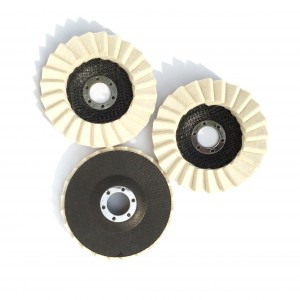In an era where industries are increasingly intersecting and collaboration is key to driving progress, wool felt wheels are emerging as unexpected catalysts for cross – industry innovation. These humble polishing tools, with their unique properties and versatility, are inspiring new ideas and applications that span multiple sectors, fostering a spirit of creativity and technological advancement.
One notable area of cross – industry innovation is the combination of wool felt wheels with the field of nanotechnology. Nanotechnology researchers are constantly seeking ways to manipulate and refine materials at the nanoscale. Wool felt wheels, when used in conjunction with specialized nanopolishing compounds, offer a novel approach to surface modification at the nanometer level. Scientists are exploring how the fine wool fibers can interact with nanomaterials, such as carbon nanotubes and graphene, to create new surface textures and properties. This could have far – reaching implications for industries like electronics, where nanoscale surface finishes can enhance the performance of components, and the aerospace sector, where improved surface characteristics can contribute to better fuel efficiency and durability of aircraft parts.
The intersection of wool felt wheels with the 3D printing industry is another exciting frontier. As 3D printing technology continues to evolve, the need for post – processing techniques to enhance the surface quality of printed objects becomes increasingly important. Wool felt wheels provide an effective solution for polishing and finishing 3D – printed parts. Whether it’s smoothing out the rough layers of a plastic print or refining the surface of a metal 3D – printed component, wool felt wheels can be customized to meet the specific requirements of different 3D – printed materials. This integration not only improves the aesthetic appeal of 3D – printed products but also expands their functionality, making them more suitable for applications in industries such as automotive prototyping, medical device manufacturing, and consumer product design.
In the realm of sustainable materials and circular economy initiatives, wool felt wheels are also playing a role in driving innovation. Researchers are exploring ways to use wool felt wheels made from recycled or upcycled wool fibers in combination with bio – based polishing compounds. This not only reduces the environmental impact of the polishing process but also opens up new opportunities for waste management and resource conservation. By collaborating with industries focused on sustainable development, such as the textile recycling sector and the renewable energy industry, the wool felt wheel industry can contribute to the creation of more sustainable manufacturing practices and closed – loop systems.
The cross – industry innovation sparked by wool felt wheels is not only limited to technological advancements but also extends to business models and partnerships. Companies from different sectors are coming together to co – develop new products and services that leverage the unique capabilities of wool felt wheels. For example, a wool felt wheel manufacturer might partner with a high – tech materials company to create a specialized polishing solution for a new type of composite material. These collaborations not only drive innovation but also create new market opportunities and revenue streams for all parties involved.
As industries continue to converge and the demand for innovative solutions grows, wool felt wheels are likely to remain important catalysts for cross – industry innovation. Their ability to bridge different sectors and inspire new ideas makes them a valuable asset in the pursuit of technological progress and sustainable development.

Post time: Jun-13-2025
